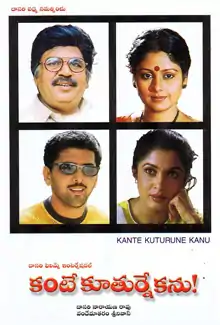Kante Koothurne Kanu
Kante Koothurne Kanu (transl. If you give birth, then give birth to a daughter) is a 1998 Indian Telugu-language drama film written, directed and produced by Dasari Narayana Rao starring Ramya Krishna in the lead role.[1] The film won the National Film Award Special Mention Feature Film,[2] "for taking a stand on gender discrimination" at the 46th National Film Awards, and won five state Nandi Awards including Best Feature Film.[3] The film was later remade in Kannada Language as Hetthare Heranne Herrabekku (2007).[4][5]
| Kante Koothurne Kanu | |
|---|---|
 Movie poster | |
| Directed by | Dasari Narayana Rao |
| Written by | Dasari Narayana Rao Thotapalli Madhu (dialogues) |
| Produced by | Dasari Narayana Rao |
| Starring | Ramya Krishnan Dasari Narayana Rao Jayasudha Babloo Prithiveeraj |
| Cinematography | K. S. Hari |
| Edited by | B. Krishnam Raju |
| Music by | Vandemataram Srinivas |
Production company | Dasari Films International |
Release date | 25 December 1998 |
Running time | 133 minutes |
| Country | India |
| Language | Telugu |
Plot
The film explores the intricacies of gender discrimination, and misogyny in India.
Cast
Soundtrack
| # | Song | Singer |
|---|---|---|
| 1 | "Kante Koothurne" | Vandemataram Srinivas |
| 2 | "Theluginti" | S. P. Balasubrahmanyam |
Awards
- Special Jury Award (Feature Film - Director) - Dasari Narayana Rao
- Nandi Awards - 1998[6]
- Second Best Feature Film - Silver - Dasari Narayana Rao
- Best Director - Dasari Narayana Rao
- Best Story Writer - Dasari Narayana Rao
- Best Lyricist - Suddala Ashok Teja
- Special Jury Award - Ramya Krishna
References
- Rajavarapu, Deepak. "10 Powerful Characters That Only Ramya Krishnan Can Pull Of Like A Queen". Chai Bisket.
- "46th National Film Awards" (PDF). Directorate of Film Festivals. Retrieved 12 March 2012.
- "Kante Koothurne Kanu Awards: List of Awards won by Telugu movie Kante Koothurne Kanu". The Times of India. Timesofindia.indiatimes.com. Retrieved 6 January 2020.
- "Women In Cinema - Kante Koothurne Kanu Movie Special - 02 - video dailymotion". Dailymotion.com. 13 July 2012. Retrieved 6 January 2020.
- "Dasari Narayana Rao tribute: The original trendsetter". The Hindu. 31 May 2017. Retrieved 6 January 2020.
- "నంది అవార్డు విజేతల పరంపర (1964–2008)" [A series of Nandi Award Winners (1964–2008)] (PDF). Information & Public Relations of Andhra Pradesh. Retrieved 21 August 2020.(in Telugu)
External links
This article is issued from Wikipedia. The text is licensed under Creative Commons - Attribution - Sharealike. Additional terms may apply for the media files.